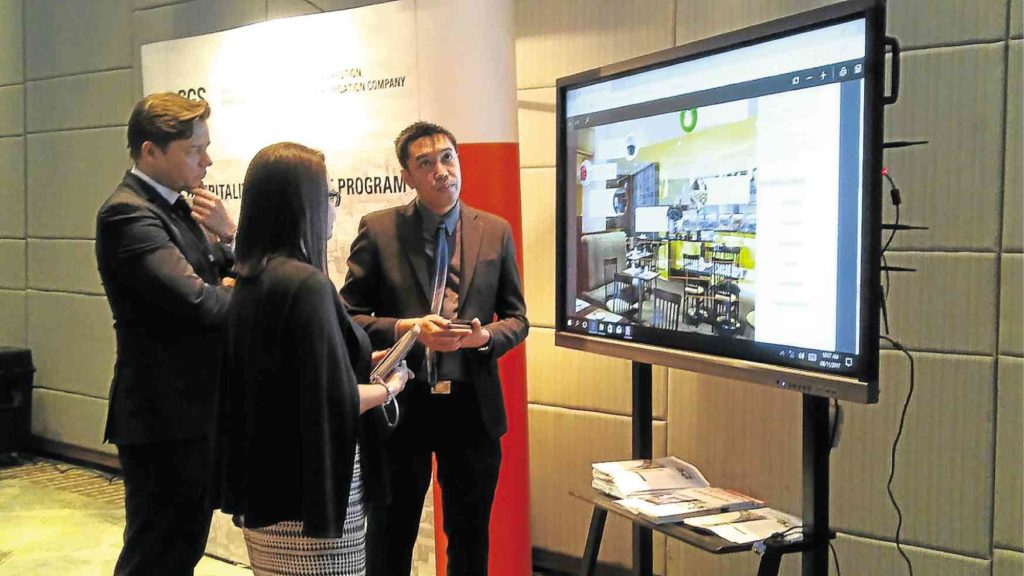Fate of PH hotel standards in the stars

SGS officials Peter Hvidberg (left) and John Reily Baluyot (right) pitch the HX program to a potential client.
When a hotel in many parts of Europe says that it is a “five-star” establishment, at the very least a guest can expect a personalized greeting with flowers or a present in the room.
This is not necessarily the case for hotels with the same rating in the Philippines, or in other countries for that matter.
That’s because countries have different standards of luxury.
And sometimes, the difference goes beyond whether you have flowers in your room or not.
Thus, the problem confronting the wandering foreign tourist: Can a sense of consistency be expected from hotels when travelling abroad?
SGS, the world’s leading inspection, verification, testing and certification company covering various industries, likes to think so.
Back in November, it launched a global certification program called the SGS Hospitality Experience Program (HX) that wants to set internationally applicable standards of luxury and comfort for the hotel industry.
The company picked the Philippines as one of its pilot countries in Southeast Asia because of favorable market conditions.
A hotelier could avail itself of at least one of four modules, each covering a comprehensive list of concerns that a culturally diverse guest list might have when staying in a hotel.
SGS had dealt with companies in the hospitality industry before, using ISO standards. However, these standards are generally applicable to many industries.
This is the first time it developed a program tailor-made for hotel companies, which company officials say make up one of the biggest industries in the market.
In fact, the multinational company performed more than 10,800 audits of hotels worldwide this year.
The overall results pointed to so-called nonconformities, 75 percent of which are related to structural issues, 15 percent to water safety issues, 10 percent to food safety.
“A big portion of your travellers that arrive here in the Philippines are foreigners, and these foreigners might have different standards that when it comes to which, many of the local hotels might either have or not,” said Peter Hvidberg, SGS Global Head for Travel and Hospitality Solutions, in an interview with reporters.
“We developed this program so that hoteliers who receive international guests have a certification mark from a company that is respected in the industry,” he said.
‘Free Marketing’
One of the four modules is risk management. The other three cover sustainability, corporate social responsibility, and quality of service experience.
Hvidberg believes that the risk module will be the “driver” in the market.
This module has more than a thousand questions, he said, which will cover six main areas: food safety, water safety, building safety, security, cybersecurity, and business continuity.
To get SGS’ approval, a hotel needs a passing score of 65 percent to get a silver certificate, over 85 percent for gold, and 95 percent or higher for platinum.
While the guest can’t know what the hotel lacked for it to earn a certificate below platinum, SGS said it would not certify a hotel if it doesn’t pass “critical items” that directly impact the consumer’s and hotel’s interests.
The module, officials say, will help lessen the risk at a time when lapses in security measures are partly responsible for some of the armed attacks that take place around the world.
According to John Reily Baluyot, project manager for travel and hospitality in South East Asia and the Pacific, the company is speaking to some hoteliers, pitching proposals for the HX program.
As expected, hotels have different needs for the program, depending on their current star rating.
Among the companies it is speaking with, the risk and sustainability modules are often the subject of inquiries.
The general assumption is, if you certify your hotel as environmentally sustainable, energy efficient, and therefore more cost-friendly, you get more brand recognition, he said.
This could be beneficial for three to four star hotels that may want to be more recognized by consumers both here and abroad.
For five-star hotels, the risk module strikes a nerve, especially since the module covers business continuity after unwanted incidents happen.
In other words, the module certifies that you know how to “act on the incident and to continue the business afterwards.”
“It’s worth saying that one of the biggest needs of the five-star hotel is business continuity and crisis management,” he said.
The HX program requires hoteliers to answer a gap assessment questionnaire, wherein the client will be informed about how close, or how far, its current practices are from the given standards.
While it’s a preview of what to expect in the module, it already contains the so-called critical items which essentially say if something runs “the risk of the life of the person” or of violating a certain regulation.
Changing mindsets
On average, SGS charges $2,000 to $3,000, or up to around P150,000, to apply for the program, which will be checked annually for three years.
The price for the certification is rather affordable for hoteliers, especially since it could help boost consumer confidence in the hotel.
This is lower compared to what SGS charges to issue an ISO certification, which ranges from nearly $5,000 to close to $8,000.
“We intentionally made it so,” said Baluyot.
Baluyot said this was because the company wanted the market to warm up to the idea that some changes needed to be done in the industry.
They have to be more conscious of very real risks, ranging from armed individuals to structural weaknesses that could give in during calamities.
“It’s not just about being able to sell the product, but it’s about changing the mindset, that they have to be more risk conscious,” he said.
He said the company expects to penetrate 5 to 10 percent of the hotel market next year, then increase that share going forward.














